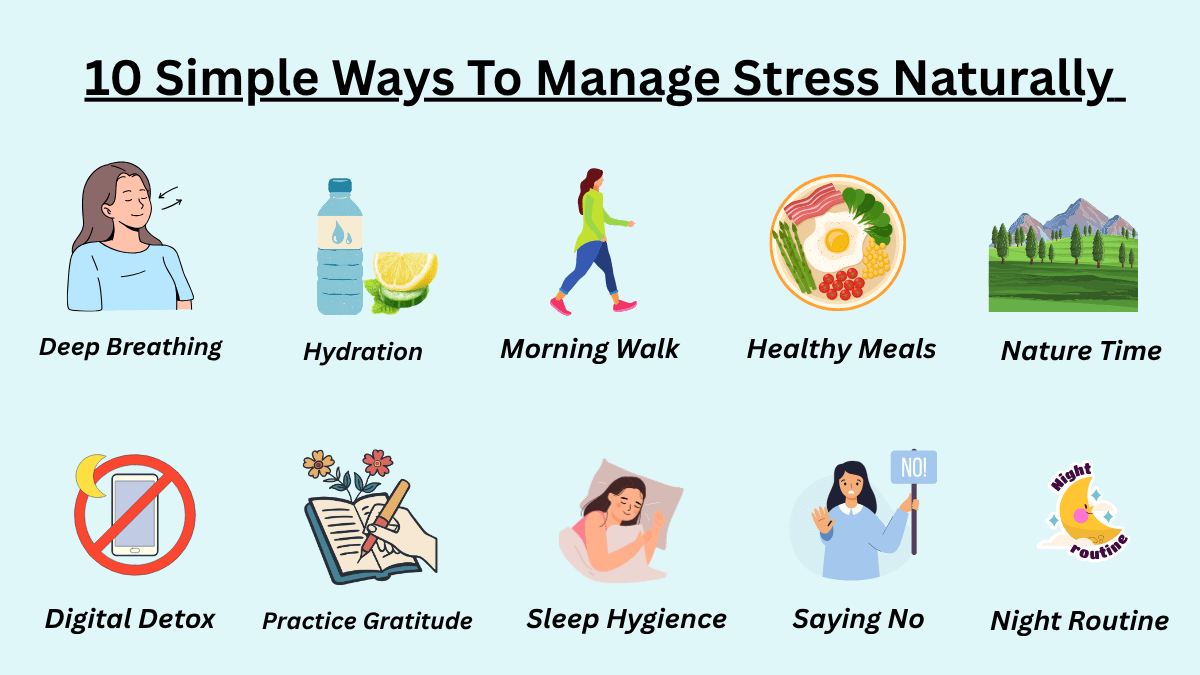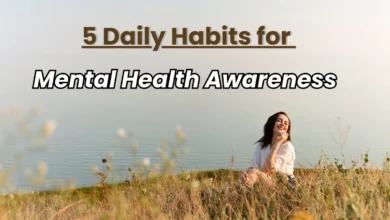How to Manage Stress Naturally: 10 Simple Daily Steps

Introduction: Why Managing Stress Naturally Matters
In today’s fast-paced world, stress has become a constant companion. whether it’s juggling responsibilities, endless notifications, or the pressure to always stay “on,” it’s easy to feel overwhelmed. Most of us know stress is harmful, but we often ignore it until it begins to affect our sleep, mood, and relationships. Instead of turning to quick fixes, learning how to manage stress naturally can create lasting calm, boost mental clarity, and improve your overall well-being.
“Almost everything will work again if you unplug it for a few minutes… including you.” – Anne Lamott
What Is Stress?
Stress is your body’s natural response to perceived challenges or threats. Physiologically, it triggers a cascade of physical and emotional reactions, such as a racing heartbeat, muscle tension, and heightened alertness. While it’s true that short bursts of stress can be helpful in emergencies, chronic stress wears down your body and mind over time. In many cases, it can manifest as anxiety, irritability, fatigue, and even physical illness. Learning how to manage stress naturally means addressing its root causes and gently guiding your body back to balance.
10 Simple Daily Steps to Manage Stress Naturally
1. Start with Deep Breathing to Reduce Stress
To start your day right, before reaching for your phone, take a few minutes to focus on your breath. Deep breathing activates the parasympathetic nervous system, which signals your body to relax.
Try this: Inhale for 4 seconds, hold for 4, exhale for 6. Repeat for 3–5 minutes.
This small habit can help regulate your nervous system, reduce morning anxiety, and improve focus—ultimately setting the tone for a calm and productive day. Over time, this simple act becomes your brain’s natural reset button and a powerful way to manage stress naturally before the day even begins.
2. Hydrate Early for Natural Stress Relief
Your brain is around 75% water. Even mild dehydration can trigger stress and fatigue. Drinking a glass of water right after waking up replenishes fluids lost overnight and supports clear thinking.
In addition, try adding a slice of lemon or cucumber to your water for a refreshing dose of antioxidants. Starting your day with hydration is not just healthy—it’s also one of the easiest ways to reduce stress naturally. More importantly, proper hydration supports digestion, nutrient absorption, and cellular function, all of which influence how your body handles tension and emotional pressure.
3. Move Daily to Manage Stress Naturally
Moreover, physical movement significantly boosts your mood by releasing endorphins—your body’s built-in stress relievers. The best part? You don’t need a gym membership. A brisk 20-minute walk, light yoga, or even dancing in your room can all help you manage stress naturally while lifting your energy and clearing your mind.
Consistent daily movement helps flush out stress hormones like cortisol and adrenaline, giving your body a reset. As a bonus, it also enhances blood circulation to the brain, improving memory, focus, and emotional stability. Even 10 minutes of movement can uplift your mood and shift your mental state.
4. Create a Mindful Morning to Stay Calm
The way you begin your day influences your stress levels. A mindful morning routine doesn’t have to be complex. It’s about creating space before the chaos.
Try this routine:
- 5 minutes of gentle stretching
- 10 minutes of journaling or gratitude listing
- No social media for the first hour
This intentional start helps your brain feel safe and stable. Over time, these small daily actions build emotional resilience—helping you manage stress naturally and face challenges with greater calm.
5. Eat to Support Mood and Reduce Stress
What you eat directly affects your mental state. Highly processed foods and excess caffeine can spike anxiety. Opt instead for whole, nutrient-dense meals.
Best foods for stress management:
- Fatty fish, chia seeds (rich in omega-3s)
- Leafy greens and berries (antioxidants)
- Probiotic-rich foods like yogurt or kimchi
In addition, eating balanced meals keeps blood sugar steady, which helps regulate mood and energy. Equally important, focus on regular mealtimes. Skipping meals or emotional eating can create hormonal chaos, adding unnecessary stress.
6. Step Outside for Mental Clarity
Nature is an underrated therapy. Studies show that even 10 minutes outdoors can lower heart rate and cortisol levels.
If stepping into nature isn’t an option, sit on a balcony or near a sunny window. Listen to natural sounds, feel the air on your skin, and let your nervous system decompress. This simple shift in environment breaks mental monotony and introduces calmness. Even natural light exposure can reset your internal clock, promoting better sleep at night.
7. Say No to Protect Your Peace
In reality, saying yes to everything puts you on the fast track to burnout. After all, every commitment you accept drains your emotional energy, whether you realize it or not. That’s why learning to say no is more than a boundary—it’s a quiet but powerful way to manage stress naturally and honor your mental health.
Practice this line: “Thanks for thinking of me, but I need to pass right now.”
Boundaries protect your mental space and help prevent resentment or overwhelm. So, remember, every “yes” you give to others is also a quiet “no” to your own peace—especially when your plate is already full. Choosing wisely is another way to manage stress naturally and protect your inner calm.
8. Reduce Screen Time
Constant exposure to screens—especially social media and news—can keep your brain in a reactive, stressed-out state.
For example, set app timers, use blue light filters at night, and replace one scrolling session a day with a walk or a good book. Reducing screen time is a simple way to manage stress naturally—it helps your brain relax, supports better sleep, and clears mental clutter. Consider creating screen-free zones at home or scheduling digital detox days to restore long-term clarity and calm.
9. Practice Daily Gratitude
Gratitude shifts your focus from what’s wrong to what’s going right. It’s a scientifically proven way to reduce stress and boost resilience.
To begin, try this: Every night, write down three things you’re grateful for. They can be simple—a warm shower, a kind message, or a quiet moment.
Over time, gratitude trains your brain to notice positivity, even during tough times. Additionally, it strengthens relationships and increases emotional intelligence—both of which are essential buffers against stress.
10. Create a Calming Night Routine
As the day ends, Stress often lingers into the night, making it hard to wind down. A calming routine signals your brain that it’s safe to relax.
Before bed, try:
- Turning off screens 30 minutes early
- Stretching or light reading
- Aromatherapy (lavender oil works wonders)
Consistency helps your body associate nighttime with peace, not pressure. As a result, a relaxing bedtime ritual also supports deeper, more restorative sleep, which is crucial for emotional regulation.
Conclusion: Small Steps to Manage Stress Naturally
Managing stress naturally isn’t about doing everything perfectly. It’s about consistency, self-awareness, and giving yourself permission to rest. In truth, these 10 simple steps to manage stress naturally may seem small on their own, but together they create a powerful foundation for lasting emotional balance.
Start with one or two. Stick with them. Your mind and body will thank you.
“Because you deserve a life that feels good on the inside, not just looks good on the outside.”
Ultimately, Natural stress management is a daily commitment—a conscious decision to tune in instead of pushing through. When you listen to your body, honor your needs, and take action gently, you begin to transform how you live. The goal isn’t to eliminate stress entirely, but to respond to it with care, confidence, and calm.










I don’t think the title of your article matches the content lol. Just kidding, mainly because I had some doubts after reading the article.
If you are looking for Nesine alternatives with guarantees, Garantidennesine might be what your needs, I recommend you to take a look for more information: garantidennesine
Thanks for sharing. I read many of your blog posts, cool, your blog is very good.
Can you be more specific about the content of your article? After reading it, I still have some doubts. Hope you can help me. https://accounts.binance.com/si-LK/register?ref=LBF8F65G
Thank you for your sharing. I am worried that I lack creative ideas. It is your article that makes me full of hope. Thank you. But, I have a question, can you help me? https://accounts.binance.info/ES_la/register-person?ref=VDVEQ78S
Your point of view caught my eye and was very interesting. Thanks. I have a question for you. https://accounts.binance.info/register-person?ref=IXBIAFVY
Your article helped me a lot, is there any more related content? Thanks!
Your article helped me a lot, is there any more related content? Thanks! https://www.binance.com/ph/register?ref=IU36GZC4
I don’t think the title of your article matches the content lol. Just kidding, mainly because I had some doubts after reading the article. https://accounts.binance.info/ph/register-person?ref=IU36GZC4
**prostafense**
ProstAfense is a premium, doctor-crafted supplement formulated to maintain optimal prostate function, enhance urinary performance, and support overall male wellness.